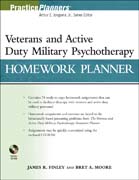
Veterans and active duty military psychotherapy homework planner
Finley, James R.
Moore, Bret A.
INDICE: Practice Planner Series Preface. Preface. SECTION IAdjustment to Killing. Exercise I.A Normal Reactions to Killing. Exercise I.B When Killing is Necessary. SECTION IIAdjustment to the Military Culture. Exercise II.A How DidI Imagine my Life in the Military? Exercise II.B All for One and One for All.SECTION IIIAmputation, Loss of Mobility, Disfigurement. Exercise III.A Mourning and Acceptance. Exercise III.B What Makes Me Who I Am? SECTION IVAnger Management and Domestic Violence. Exercise IV.A Anger as a Drug. Exercise IV.B Being Who I Want to Be. SECTION VAntisocial Behavior in the Military. Exercise V.A What Was I Thinking? Exercise V.B Mentorship and Respect. SECTION VI Anxiety. Exercise VI.A Action, Coping Skills, and Acceptance. Exercise VI.B Getting Away From Catastrophizing. SECTION VII Attention and Concentration Deficits. Exercise VII.A Staying Focused. Exercise VII.B Structuring My Life. SECTION VIIIBereavement Due to the Loss of a Comrade. Exercise VIII.A Commemorating Lost Friends and Family. Exercise VIII.B How Do I Want to be Remembered? SECTION IXBorderline Personality. Exercise IX.A Am I Comparing My Insides to Other People's Outsides? Exercise IX.B I Can't Believe Everything I Think. SECTION X Brief Reactive Psychotic Episode. Exercise X.A Staying in Touch with Reality. Exercise X.B Reality Checks. SECTION XI Chronic Pain after Injury. Exercise XI.A Alternative Methods for Managing Pain. Exercise XI.B Coping with Addiction andChronic Pain. Exercise XI.C Helping Myself by Helping Others. SECTION XII Combat and Operational Stress Reaction. Exercise XII.A Normal Reactions in Extreme Situations. Exercise XII.B Healthy Ways to Handle Stress Fast. SECTION XIII Conflict with Comrades. Exercise XIII.A Communication and Conflict Management Skills. Exercise XIII.B Understanding Sources of Conflict. SECTION XIV Depression. Exercise XIV.A Challenging Depressive Illusions. Exercise XIV.B From Acceptance to Appreciation. SECTION XV Diversity Acceptance. Exercise XV.A Different People, Different Strengths. Exercise XV.B We're More Alike Than We Look Seeing Past the Surface. SECTION XVI Financial Difficulties. Exercise XVI.A Money Management Skills. Exercise XVI.B Spending as a Drug. SECTION XVII Homesickness/Loneliness. Exercise XVII.A Making the Best of Wherever I Am. Exercise XVII.B This, Too, Shall Pass Taking it One Day at a Time. SECTION XVIII Insomnia.Exercise XVIII.A Why Can't I Sleep? Exercise XVIII.B Sleep Management. SECTION XIX Mild Traumatic Brain Injury. Exercise XIX.A Adapting to a Brain Injury. Exercise XIX.B Helping Family and Friends Help Me. SECTION XX Nightmares. Exercise XX.A What Are My Dreams Telling Me? Exercise XX.B Avoiding and Coping with Nightmares. SECTION XXI Opioid Dependence. Exercise XXI.A Near-Term and Long-Term Effects of Opioid Dependence and Withdrawal. Exercise
- ISBN: 978-0-470-89052-3
- Editorial: John Wiley & Sons
- Encuadernacion: Rústica
- Páginas: 336
- Fecha Publicación: 26/01/2011
- Nº Volúmenes: 1
- Idioma: Inglés
